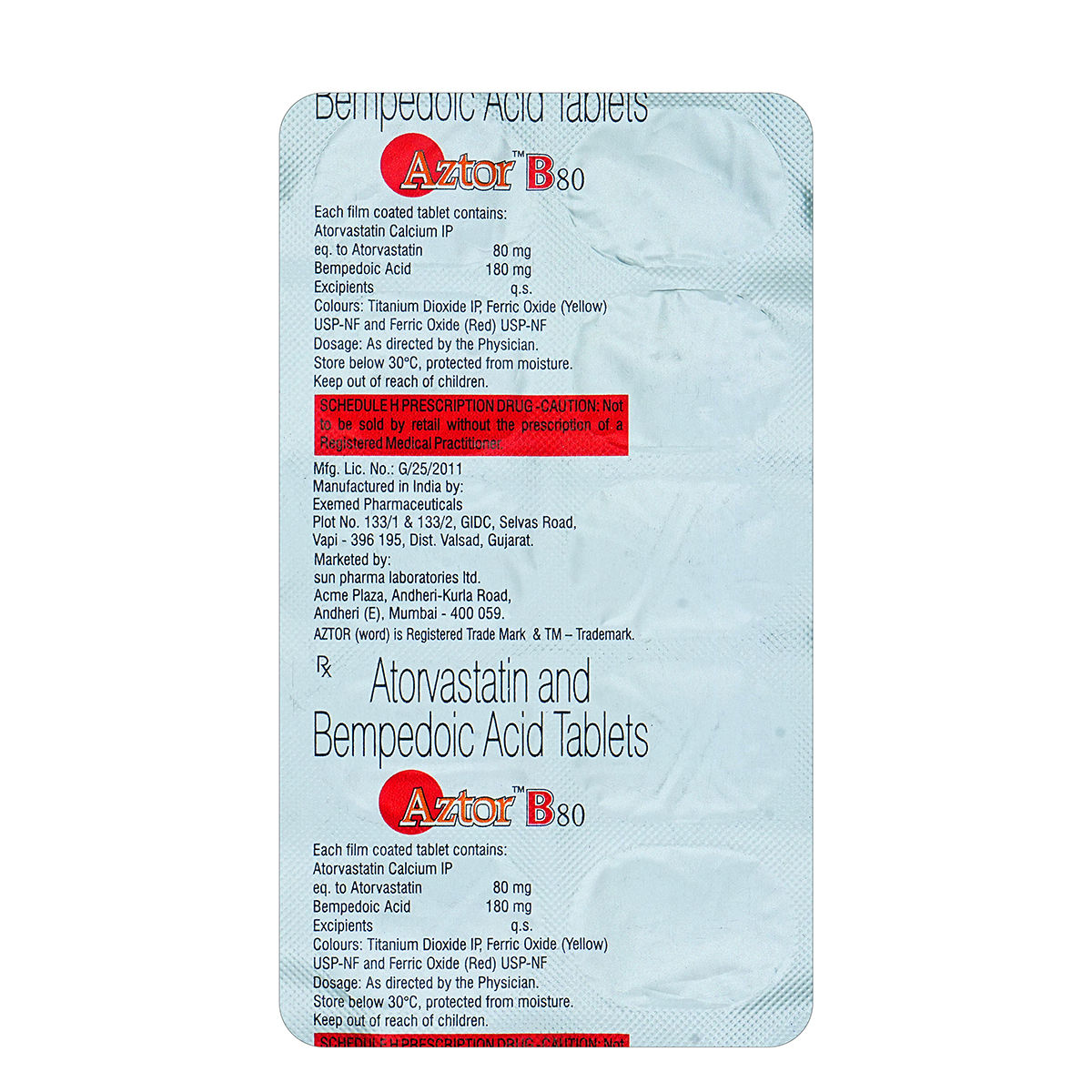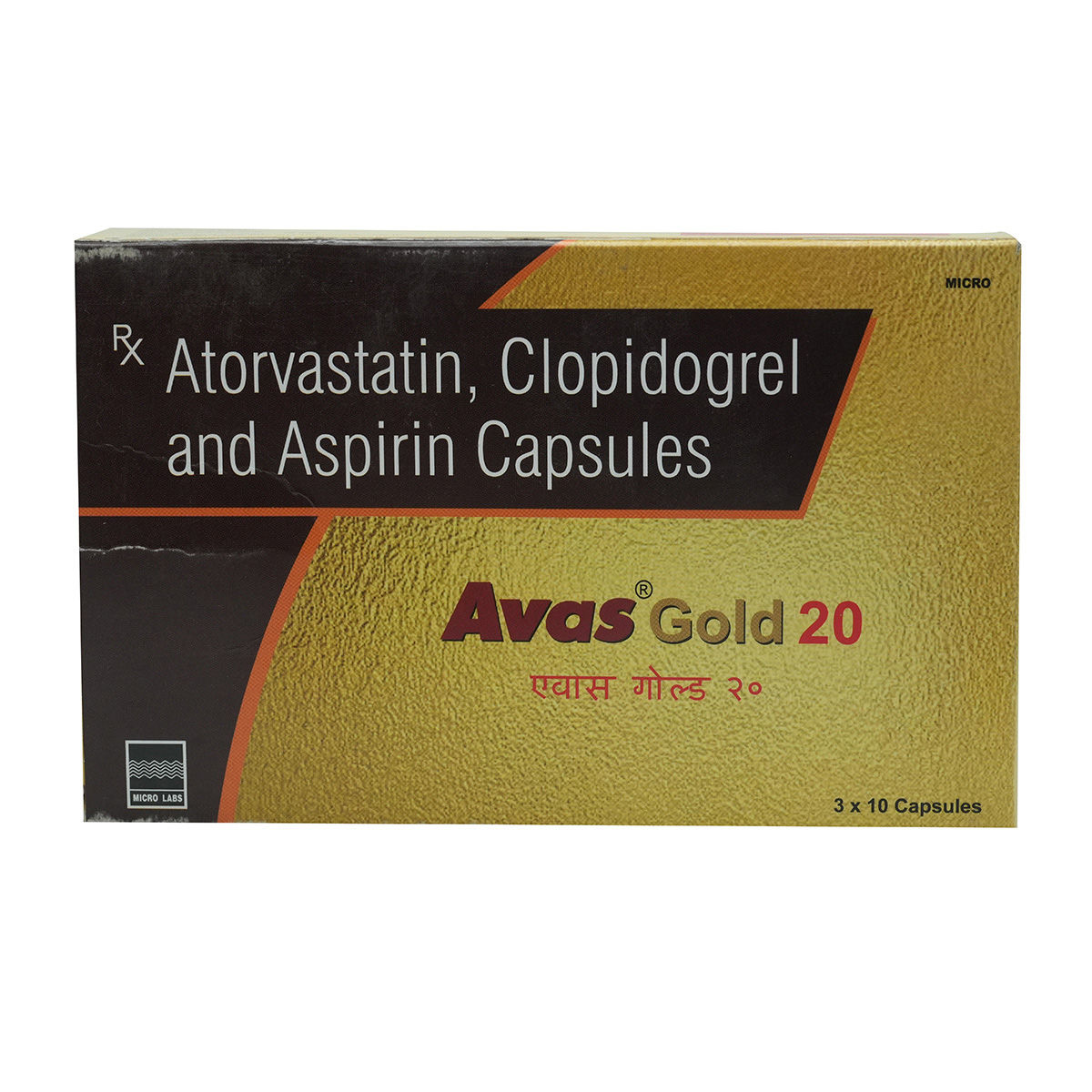Atorvastatin+nicotinic Acid
About Atorvastatin+nicotinic Acid
Atorvastatin+nicotinic Acid belongs to a class of medications called antilipemic (cholesterol-lowering agent). Atorvastatin+nicotinic Acid is used to treat raised cholesterol levels in our body. Atorvastatin+nicotinic Acid helps lower the level of low-density lipoprotein (LDL) or bad cholesterol in the blood and increases high-density lipoprotein (HDL) or good cholesterol. Dyslipidaemia is the deposition of unhealthy levels of fats (lipid) in the blood. In this condition, there is always a high level of low-density lipoprotein (LDL or bad cholesterol), triglycerides (TG), and a low level of high-density lipoprotein (HDL or good cholesterol). Atorvastatin+nicotinic Acid is an extended-release formulation that releases slowly for a longer duration of time.
Atorvastatin+nicotinic Acid contains two medicines, namely atorvastatin and nicotinic acid (vitamin B3). Atorvastatin is a lipid-lowering medication that blocks the enzyme required to make cholesterol in the body. It reduces the bad cholesterol (also known as low-density lipoproteins or LDL), triglycerides (TG) and increases the levels of good cholesterol (also known as high-density lipoproteins or HDL). On the other hand, Atorvastatin+nicotinic Acid contains nicotinic acid, which is a form of vitamin B that further increases good cholesterol levels (HDL).
Take Atorvastatin+nicotinic Acid as prescribed by your doctor. You are advised to take Atorvastatin+nicotinic Acid for as long as your doctor has prescribed it for you, depending on your medical conditions. You may experience constipation, nausea, stomach pain, weakness, muscle pain, headache, dizziness, itching, flushing of the skin, the increased glucose level in the blood. Most of these side effects of Atorvastatin+nicotinic Acid do not require medical attention and gradually resolve over time. However, if the side effects are persistent, reach out to your doctor.
Do not take Atorvastatin+nicotinic Acid if you are allergic to Atorvastatin+nicotinic Acid, or any other ingredients present in it. Atorvastatin+nicotinic Acid should not be taken in conditions like liver disease or kidney disease. Atorvastatin+nicotinic Acid should not be prescribed to children less than 10 years of age. Immediately inform your doctor before taking Atorvastatin+nicotinic Acid if you are pregnant or planning to get pregnant, breastfeeding. Atorvastatin+nicotinic Acid has negligible influence on the ability to drive and use machines. Do not drink too much while taking this medicine.
Uses of Atorvastatin+nicotinic Acid
Medicinal Benefits
Atorvastatin+nicotinic Acid taken with dietary measures helps treat high cholesterol, especially for heart patients when initial dietary measures fail to lower cholesterol. It helps lower the bad cholesterol (LDL) and increases the level of good cholesterol (HDL) in the state of dyslipidemia or hyperlipidemia. Atorvastatin+nicotinic Acid is considered more effective compared to other cholesterol-lowering medicines. Atorvastatin+nicotinic Acid also lowers the amount of fat or cholesterol deposition (plaque) in the heart's arteries, thereby reducing the chance of having a heart attack or stroke in the future. Atorvastatin+nicotinic Acid contains nicotinic acid, which is a form of vitamin B that further increases good cholesterol levels (HDL).
Directions for Use
Storage
Side Effects of Atorvastatin+nicotinic Acid
- Constipation
- Nausea
- Stomach pain
- Weakness
- Muscle pain
- Abnormal heart rhythm
- Abnormal liver function tests
- Headache
- Arthralgia
- Dizziness
- Diarrhea
- Itching
- Peripheral Edema
- Flushing of skin
- Increased glucose level in the blood
Drug Warnings
Atorvastatin+nicotinic Acid may cause a breakdown of skeletal muscle tissue, leading to kidney failure. This condition usually occurs in the elderly, people with kidney disease, and poorly controlled hypothyroidism (underactive thyroid). Atorvastatin+nicotinic Acid should not be prescribed to children less than 10 years of age. You should contact a doctor before if you have had an allergic reaction to Atorvastatin+nicotinic Acid, have a liver problem (jaundice, liver cirrhosis), or kidney problems, pregnant or planning to get pregnant, breastfeeding, have severe lung disease, have a previous heart attack or stroke caused by bleeding in the brain, have hypothyroidism, drink more than 2 servings of alcohol per day and have a muscle disorder (fibromyalgia) and damaged muscle tissue (rhabdomyolysis).
Drug Interactions
Drug-Drug Interaction: This medicine may interact with immunosuppressant medicines (cyclosporine), cholesterol-lowering medicines (gemfibrozil), antifungal (itraconazole), antiviral/HIV medicine (ritonavir), medicines for heart disease (digoxin), blood thinner (warfarin), anti-hypertensive drugs (like verapamil, diltiazem).
Drug-Food Interaction: Atorvastatin+nicotinic Acid may interact with grapefruit. It increases the concentration of Atorvastatin+nicotinic Acid in your body.
Drug-Disease Interaction: Patients with serious liver disease (jaundice), kidney disease, lung disease, thyroid disease, and muscle weakness (rhabdomyolysis) should be closely monitored while having treatment with Atorvastatin+nicotinic Acid.
Drug-Drug Interactions Checker List:
Safety Advice

Alcohol
unsafeDo not drink too much while taking this medicine. Drinking a lot of alcohol, you may be more likely to get muscle and liver side effects.

Pregnancy
unsafeAtorvastatin+nicotinic Acid is not recommended during pregnancy. Contact your doctor before taking Atorvastatin+nicotinic Acid.

Breast Feeding
unsafeBreastfeeding is not recommended. Contact your doctor before taking Atorvastatin+nicotinic Acid.

Driving
unsafeAtorvastatin+nicotinic Acid has negligible influence on the ability to drive and use machines.

Liver
cautionAtorvastatin+nicotinic Acid to be taken with caution, especially if you have a history of Liver diseases/conditions. The dose may have to be adjusted by your doctor.

Kidney
cautionAtorvastatin+nicotinic Acid to be taken with caution, especially if you have a history of Kidney diseases/conditions. The dose may have to be adjusted by your doctor.

Children
unsafeAtorvastatin+nicotinic Acid is not indicated in the treatment of patients below the age of 10 years.
Habit Forming
Diet & Lifestyle Advise
- Try aromatherapy, yoga, meditation to help relax your body and mind.
- Try to do breathing exercises to get more oxygen.
- Eat a healthy diet rich in soluble fiber like beans, legumes, whole grain, flax, apples, and citrus fruits.
- Try to replace most of your saturated fats with unsaturated fats that can reduce total cholesterol and LDL cholesterol in a short span of time. Foods like avocados, olive oil, fatty fish, and nuts contain many heart-healthy unsaturated fats, so it’s beneficial to eat them regularly.
- Try to adopt a Mediterranean-style diet rich in olive oil, fruits, vegetables, nuts, whole grains, fish, and low in red meat and most dairy.
- Try to give priority to more fruits and veggies in your daily meal as these contain antioxidants that help to lower LDL
- Minimize the intake of added sugar. The American Heart Association (ADA) recommends, one should not eat more than 100 calories (25 grams) of added sugar for women and children and no more than 150 calories (37.5 grams) for men every day.
- American Heart Association recommends sodium chloride intake (table salt) should not exceed more than 2,300 mg per day as part of a healthy eating pattern.
- As a precautionary measure, do not consume alcohol and quit smoking.
Special Advise
If muscle fatigue or muscle pain affects your daily activity. Try to contact a doctor if you have muscle weakness or fatigue.
Patients Concern
Disease/Condition Glossary
High cholesterol: Cholesterol is a waxy substance produced by the liver to protect nerves, make tissue, and various hormones. Our body also receives cholesterol from the food we eat, like cooking oils, eggs, meats, and dairy products. Excess cholesterol is bad for our health. There are two types of cholesterol, namely 'bad cholesterol' and 'good cholesterol'. Bad cholesterol comprises low-density lipoprotein (LDL) and triglycerides (TG), while good cholesterol consists of high-density lipoprotein (HDL). Usually, there are no specific symptoms of raised or high cholesterol levels but a large deposition of cholesterol in the arteries (plaque) or heart blockage. Blocked artery or plaque formation in the heart's arteries can lead to chest pain (angina), heart attack, or stroke. It is advisable to have complete cholesterol tests (lipid profile test) at least once a year. It will help you to closely monitor your heart health and risk of heart attack and stroke.
FAQs
Atorvastatin+nicotinic Acid is used to treat raised cholesterol levels in our body. Atorvastatin+nicotinic Acid is a combination of two medicines, namely atorvastatin and nicotinic acid (vitamin B3). Atorvastatin is a lipid-lowering medication that blocks the enzyme required to make cholesterol in the body. It reduces the bad cholesterol (also known as low-density lipoproteins or LDL), triglycerides (TG) and increases the levels of good cholesterol (also known as high-density lipoproteins or HDL). On the other hand, Atorvastatin+nicotinic Acid contains nicotinic acid, which is a form of vitamin B that further increases good cholesterol levels (HDL).
Yes. Muscle weakness can be the long-term side effects of Atorvastatin+nicotinic Acid. You may have muscle fatigue or muscle pain which affects your daily activity. Try to contact a doctor if you have muscle weakness or fatigue.
Atorvastatin+nicotinic Acid can raise your blood sugar a little. If you already have type 2 diabetes, please consult your doctor. Your doctor may adjust the dosage of Atorvastatin+nicotinic Acid.
Yogurt has the ability to lower cholesterol to its probiotic content. Yogurt eaters have a better metabolic profile than those who did not eat yogurt.
Most of the time, high cholesterol levels are associated with an unhealthy lifestyle. The most common causes include obesity, smoking, genetic factors, sedentary lifestyle, unhealthy eating habits, and family history.
You are recommended not to stop taking Atorvastatin+nicotinic Acid suddenly, as it may raise your cholesterol levels and increase the risk of stroke or heart attack. Always consult your doctor before stopping Atorvastatin+nicotinic Acid.
Atorvastatin+nicotinic Acid can cause an increase in blood sugar levels in people with diabetes. There is no need to stop Atorvastatin+nicotinic Acid, but you should consult your diabetologist for advice on managing your diabetes. If necessary, the doctor may adjust your treatment or change the medication to avoid potential interactions.
Cholesterol is a precursor to lipids or fats in the body and is an essential component of cell membranes. However, an elevated level of LDL cholesterol (responsible for transporting cholesterol to tissues) can result in plaque formation, atherosclerosis, and narrowing of blood vessels. This restricts blood flow and increases the risk of coronary heart disease. Atorvastatin+nicotinic Acid, containing Atorvastatin, helps reduce cholesterol build-up in the body. By lowering cholesterol levels, it lowers atherosclerosis, reducing the likelihood of heart attacks and delaying complications related to the heart and blood vessels.
Atorvastatin+nicotinic Acid causes side effects such as constipation, nausea, vomiting, weakness, muscle pain, headache, dizziness, diarrhea, itching, peripheral edema, and increased glucose in the blood. However, consult a doctor if these persist longer.









